![]()
Sun, Jan 22, 2012
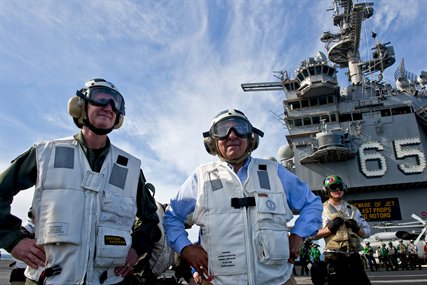
Defense Secretary Leon E. Panetta (R) and Navy Rear Adm. Walter E. Carter Jr. (L), commander of Carrier Strike Group 12, watched flight operations aboard the aircraft carrier USS Enterprise in the Atlantic Ocean, Jan. 21, 2012. (U.S. Navy photo by Petty Officer 3rd Class Scott Pittman / www.defense.gov)
USS Abraham Lincoln transits Hormuz; USS Enterprise to Transit Hormuz in March
A DebkaFile report: “Panetta: USS Enterprise carrier group to transit Hormuz in March”.
Three weeks after Tehran threatened action against any US aircraft carrier entering the Strait of Hormuz, Washington made two moves: US Defense Secretary Leon Panetta disclosed Sunday, Jan. 22, that the USS Enterprise Carrier Strike Group would steam through the strategic strait in March; a few hours later, the US Navy sent the USS Abraham Lincoln carrier through the strategic strait without incident, accompanied by British and French warships. This was a direct message to Tehran that the US would continue to deploy ships there.
DEBKAfile’s military sources report that the Iranian threat was issued on Jan 4. The USS Stennis aircraft carrier passed through the Strait of Hormuz into the Sea of Oman on Dec. 28 during a big Iranian naval exercise Velyate 90 and was then prevented by the threat from re-entering the Strait of Hormuz, through which one-fifth of the world’s oil is shipped to market.
DEBKAfile: Defusing the Hormuz crisis set the scene for resumed nuclear negotiations leading up to which several messages were exchanged through back channels between the Obama administration and Tehran in recent weeks – amid Israeli preparations to strike Iran’s nuclear facilities.
These developments deepened the breach between the US and Israel. Two days earlier, on Friday, Jan. 20, Gen. Martin Dempsey, Chairman of the Joint US Chiefs of Staff, visited Israel and with Israeli leaders emphasized the cooperation between Washington and Jerusalem on the Iranian threat. The Netanyahu government complained that action against Iran had been postponed for years on one pretext on another, and the same thing was happening to effective sanctions against Iran’s oil exports and central bank. Israel was therefore compelled to exercise its military option against the mortal peril of a nuclear Iran, said the Israeli prime minister, before it was too late.
Then Sunday, Jan. 22, Defense Secretary Panetta stood in a hangar of the Enterprise clad in the uniform of a ship’s crewman and told an audience of 1,700 personnel that the carrier would be sent to Hormuz in March. His statement was a red herring. A few hours later, the Abraham Lincoln was already through.
But what he said on the Enterprise was this:
“That’s what this carrier is all about. That’s the reason we maintain a presence in the Middle East… We want them to know that we are fully prepared to deal with any contingency and it’s better for them to try to deal with us through diplomacy.”
DEBKAfile’s Washington sources note that Panetta was the first high-ranking administration official to give Tehran an ultimatum: Accept the American offer to negotiate terms for halting your nuclear weapon program, or face up to America’s mighty fleet of American aircraft carriers.
“Our view is that the carriers, because of their presence, because of the power they represent, are a very important part of our ability to maintain power projection both in the Pacific and in the Middle East,” said the defense secretary.
However, behind this show of strength, Washington was actively preparing to sit down and talk.
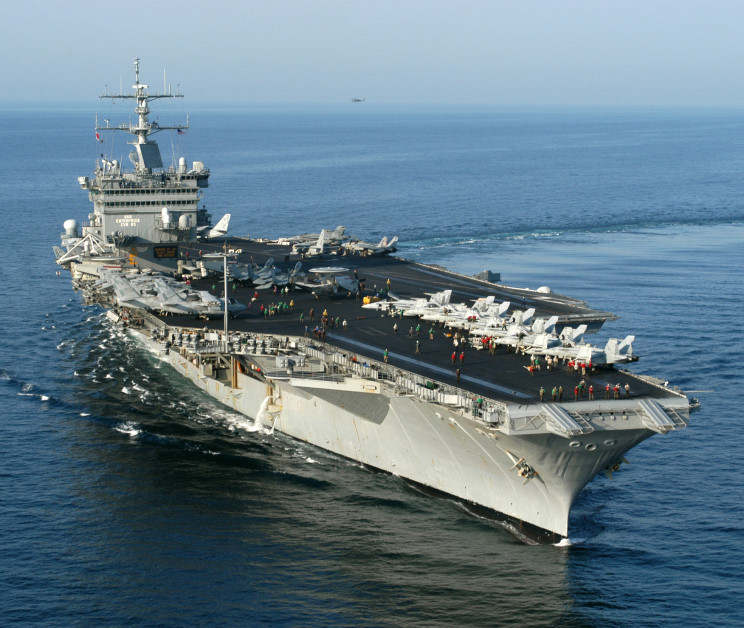
USS Enterprise seen in the Atlantic en route to the Arabian Gulf, October 21, 2003. (U.S. Navy photo by Photographer's Mate Second Class (AW) Douglas M. Pearlman)
Saturday, Jan. 21, the Washington Post disclosed that Obama had sent a special emissary to Tehran with an oral message proposing that Iran join the United States for resumed nuclear negotiations.
The emissary was not named — although there was some speculation that the Turkish Foreign Minister was chosen for the mission — nor was Iran’s reply revealed.
According to the WP, the message ran as follows: The United States and the international community have a strong interest in the free flow of commerce and freedom of navigation in all international waterways… Since taking office, the president has made it clear that he is willing to engage constructively and seriously with Iran about its nuclear program.
Also on Saturday, Iran’s Revolutionary Guards stated it considered the likely return of US warships to the Gulf part of its routine activity. They were not climbing down from their original threat. The statement came only after Tehran saw the USS Stennis, the object of threat, exiting the Gulf Friday, Jan. 20, and decided it was the Americans who had backed down.
Panetta’s comments Sunday aimed at correcting that impression and making it very clear to Tehran that although the Stennis was gone, the Abraham Lincoln was there and the Enterprise was coming “fully prepared to deal with any contingency.”



 RSS
RSS


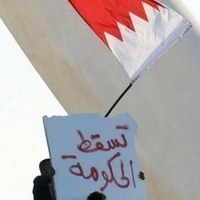
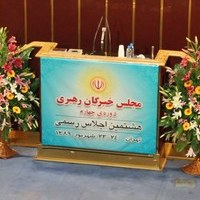

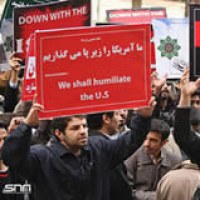




Latest Comments
Hello Mike, Thank you for your positive feedback to the article. I felt there wasn’t too much critical analysis of ...
Thanks for this considered and well constructed article. A follow up article on the manner in which the editorial contro...
THE CLUELESSNESS OF CLAIMING THAT OBAMA'S MIDDLE EAST POLICIES WERE A FAILURE CANNOT BE FURTHER FROM THE TRUTH, WHAT THE...
As long as Obama is the president of the usa do not trust the us government......
Thank you for an good read....